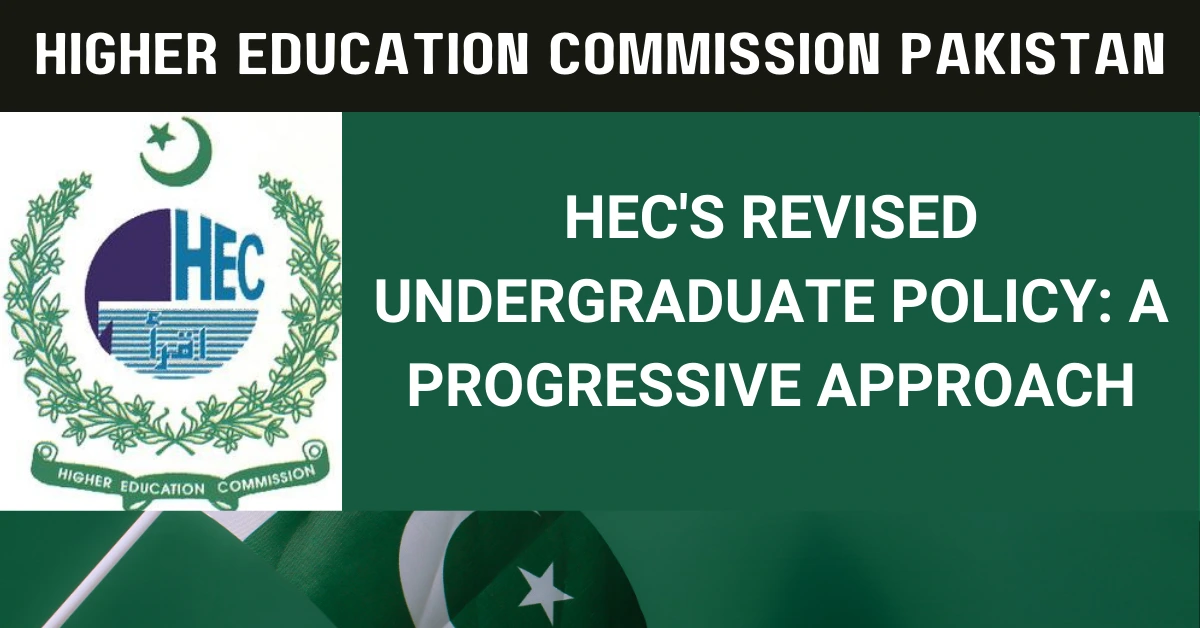Pakistan’s newly introduced Undergraduate Education Policy represents a significant advancement in promoting interdisciplinary education.
The Higher Education Commission (HEC) of Pakistan has initiated a mandatory new Undergraduate Education Policy (UGE) that will be implemented in all public universities beginning in Fall 2024. This policy is designed to transform undergraduate education in Pakistan by emphasizing a comprehensive and interdisciplinary curriculum that promotes critical thinking, intellectual curiosity, and a diverse knowledge base.
In my opinion, this new Undergraduate Education Policy represents a significant advancement in the educational standards of Pakistan. This strategic initiative aligns our educational framework with international benchmarks and entails a comprehensive overhaul of undergraduate programs. Essential elements of the policy include core courses in ‘General Education’, ‘Interdisciplinary/Distribution Subjects’, a mandatory ‘Internship/Field Experience’, and a ‘Capstone Project’, in addition to specialized subject courses. It also provides the opportunity to earn an ‘Associate Degree’ upon fulfilling the two-year course requirements.
Nevertheless, the implementation of this new policy across universities and affiliated colleges poses considerable challenges. A primary concern is the acute shortage of qualified educators, particularly in higher education institutions located outside major urban centers. These institutions face difficulties in recruiting instructors who can effectively teach a broad spectrum of general education and interdisciplinary courses, which adversely affects the quality of education and the availability of diverse course offerings.
Many institutions, especially those located in rural or underdeveloped regions, are deficient in the essential infrastructure and resources required for a holistic educational experience. This includes modern teaching tools, libraries, laboratories, and digital platforms, which are crucial for the effective implementation of contemporary educational approaches.
Furthermore, despite the Higher Education Commission’s (HEC) initiatives to disseminate policy guidelines, a significant gap in comprehension persists among faculty and administrative personnel. This is largely attributed to inadequate training provided by the implementing bodies and a lack of clarity concerning the policy’s goals and execution strategies.
Lastly, the introduction of a new educational policy frequently faces opposition from faculty members who are accustomed to conventional teaching methodologies and curricula. Such resistance obstructs the integration of innovative teaching practices and the development of interdisciplinary courses.
As the Vice Chancellor of GC University, Lahore, from 2019 to 2023, I undertook various initiatives aimed at aligning policy with its execution, thereby improving the quality of education throughout our departments and affiliated colleges.
To begin with, we partnered with Ulearn, a prominent provider of educational technologies in Pakistan, to devise innovative strategies that would facilitate the implementation of the new undergraduate policy. Ulearn specializes in developing educational technologies, products, and services that cater to the dynamic needs of learning communities, particularly in the realm of general education courses. This collaboration enabled us to offer standardized educational resources across all departments and affiliated colleges, ensuring equitable learning opportunities for every student.
We established committees of experts tasked with creating comprehensive content for General Education courses, emphasizing interdisciplinary learning, critical thinking, creativity, and the practical application of knowledge. The most qualified educators were chosen to record lectures utilizing Ulearn’s advanced studio-classroom technologies. These recorded lectures are designed to be accessible to students nationwide, effectively addressing the issue of teacher shortages and ensuring consistent quality in education.
Furthermore, we implemented the Higher Education Commission’s policy to create Quality Enhancement Cells (QECs) in affiliated colleges to uphold educational standards. These cells are responsible for monitoring and evaluating the implementation of policies, providing feedback, and ensuring ongoing improvements in teaching and learning practices. This initiative is instrumental in achieving uniform educational quality across all institutions.
To bridge understanding gaps and mitigate resistance to change, we instituted a thorough training and capacity-building initiative for both faculty and administrative personnel. Through a series of workshops, seminars, and practical training sessions, educators were provided with the necessary skills and knowledge to effectively adopt the new policy. This initiative promotes a culture of ongoing learning and adaptability, empowering faculty members to lead change and foster innovation within the educational landscape.
The newly introduced HEC Undergraduate Policy also presents more flexible pathways for students. They now have the option to complete a two-year associate degree instead of the traditional four-year Bachelor of Science degree. Additionally, students are permitted to switch their major or pursue a double major at the same institution. However, the policy’s most compelling aspect is its emphasis on interdisciplinary learning and practical knowledge, equipping students to tackle real-world challenges. This strategy aids students in acquiring vital practical skills, enhancing their ability to contribute effectively to society.
This article urges all public sector universities and their affiliated colleges, as well as private sector institutions, to wholeheartedly adopt this vision and collaborate to reform higher education in Pakistan. By aligning our undergraduate programs with those of leading global universities, the HEC has made a significant advancement. Nevertheless, numerous universities and their affiliated colleges are facing challenges in adapting to this transition. Addressing this matter requires urgent transformative leadership within universities, capable of raising educational standards despite existing limitations.

